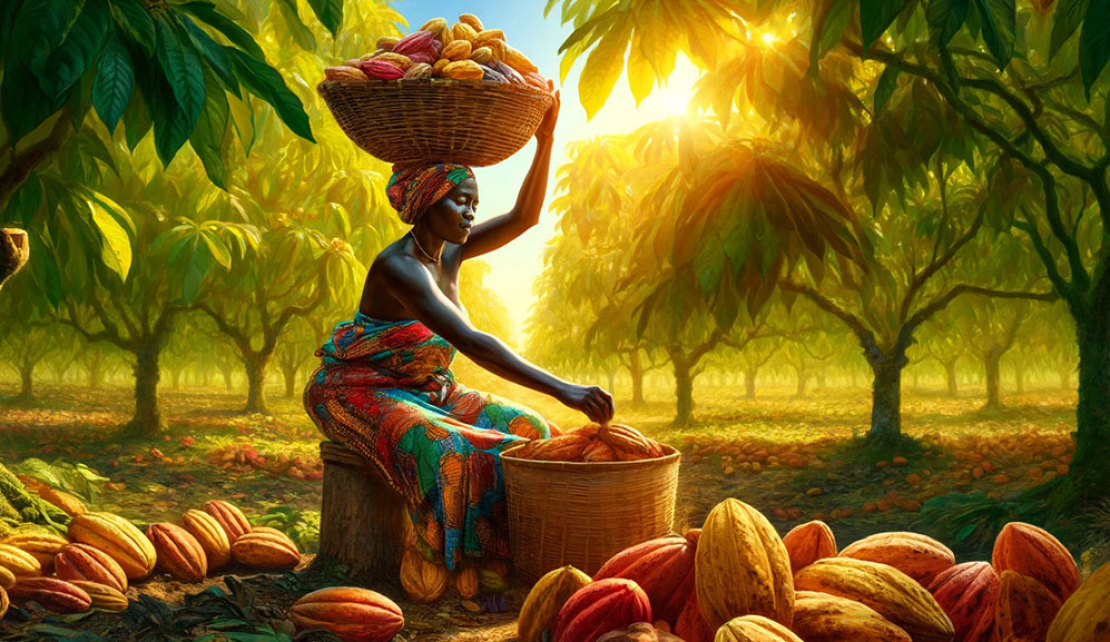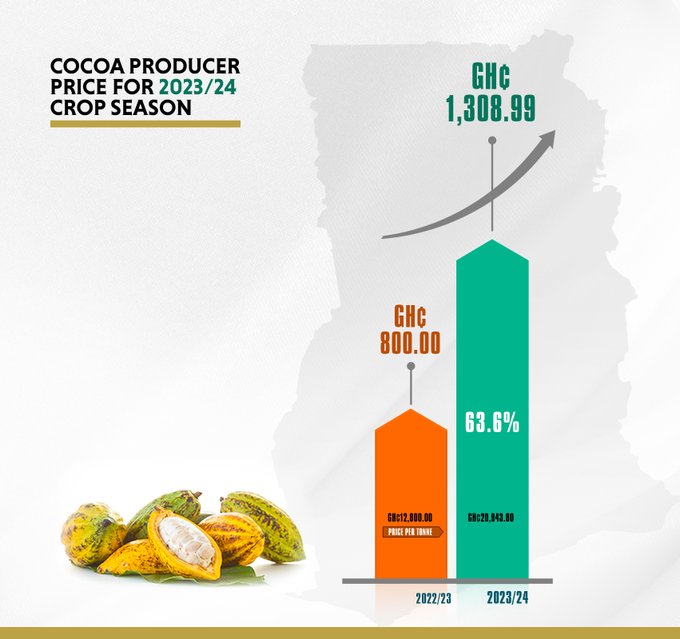AFRICA | A call for Fairness and Sweet Justice in the Bitter World of African Cocoa

ACCRA, Ghana, April 2, 2024 - In a world where the sweet indulgence of chocolate is a universal language of comfort and celebration, the unforeseen reality of catastrophic harvests in Ghana and Côte d’Ivoire, the bastions of cocoa production, heralds a wake-up call far beyond their borders.
These nations, responsible for over 60 percent of the globe’s cocoa supply, are witnessing a season that could rewrite the narrative of chocolate.
The saga unfolding in the lush fields of West Africa is not merely one of agricultural failure; it is a testament to the resilience of the human spirit in the face of adversity. Farmers, experts, and industry insiders point to a confluence of challenges—a perfect storm of illegal gold mining, climate change, sector mismanagement, and a rampant disease known as swollen shoot virus—that threatens the livelihoods of millions and the global chocolate supply.
 As New York cocoa futures soar to record highs, doubling in value within the year in an unprecedented trend, the spotlight turns to the underlying issues. The swollen shoot virus alone has laid waste to approximately 590,000 hectares of Ghanaian cocoa plantations.
As New York cocoa futures soar to record highs, doubling in value within the year in an unprecedented trend, the spotlight turns to the underlying issues. The swollen shoot virus alone has laid waste to approximately 590,000 hectares of Ghanaian cocoa plantations.
Yet, it is the enduring spirit of the cocoa farmers and the concerted efforts for sustainable solutions that shine as beacons of hope in these trying times.
The crisis in Ghana and Côte d’Ivoire ripples through the global market, pushing cocoa prices to unprecedented heights. This surge, while reflective of a strained supply chain, masks the underlying turmoil experienced by the farmers at the heart of cocoa cultivation.
Despite the global price hike, the reality for these farmers is a paradox; the decline in harvests means less income, not more. This predicament is exacerbated by the economic woes of West Africa, including inflation and currency devaluation, especially in Ghana, rendering farmers increasingly vulnerable.
At a time when the world grapples with the implications of these shortages, the resilience and determination of the cocoa farming communities in facing these challenges head-on are nothing short of inspirational.
Efforts to combat the crisis are multifaceted, ranging from the Ghana Cocoa Board's ambitious rehabilitation plans funded by a World Bank loan to grassroots movements aimed at sustainable farming practices.
Moreover, the crisis serves as a clarion call for the global community to reevaluate and invest in sustainable cocoa production. The commitment demonstrated by these nations and their farmers, amid such adversity, is a poignant reminder of the power of collective action and the enduring human spirit.
Their plight and perseverance not only shape the future of cocoa but also exemplify a broader narrative of resilience against environmental and economic challenges.
As the global dependence on West African cocoa becomes increasingly evident, an unexpected silver lining emerges amid the crisis: the bolstered bargaining power of cocoa-producing countries like Ghana and Côte d’Ivoire.
This period of adversity presents a unique opportunity for these nations to band together, advocating for more equitable terms in the global cocoa market. The stark contrast between the industry's billion-dollar revenues and the farmers' dire living conditions underscores a long-standing imbalance in the cocoa value chain.
The plight of the cocoa farmer in West Africa, struggling to make a living despite contributing to an industry valued at over $100 billion annually, highlights a bitter irony.
The current situation, characterized by record-high cocoa prices and the critical role of Ghanaian and Ivorian cocoa, offers these countries a pivotal platform to negotiate better terms that could ensure a more sustainable and fair distribution of wealth within the chocolate industry.
 Ghana's President Akufo-Addo announced that a new cocoa price for the 2023/2024 cocoa season has moved from GHC800 to GHC1,308 per bag.
Ghana's President Akufo-Addo announced that a new cocoa price for the 2023/2024 cocoa season has moved from GHC800 to GHC1,308 per bag.
The new price moved the price per tonne from GH¢ 12,800 to GH¢ 20,943.
The new price represents 63.5 percent increment of the previous one. The increment comes after cocoa farmers intensified calls for an upward review of cocoa prices to prevent the prevalence of smuggling and the situation where cocoa farmers give out their lands to illegal miners.
According to the Ghana Cocoa Board (COCOBOD), 150,000 metric tonnes of cocoa have been smuggled out of Ghana in this year alone, a phenomenon they are putting stringent measures in place to address.
“Until recently, international prices of cocoa have remained relatively low and made worse by COVID-19.
In spite of this, government has taken a very hard decision to increase producer prices of cocoa. Cocoa prices have increased from GH¢7,600 per ton in 2016 to GH¢12,800 per ton in 2022.
A significant increase of 68 percent. This has had an adverse impact on COCOBOD’s financial performance.”
“However, the sustainability of the entire industry hinges on the producer being willing to invest in business and be certain that government repays the appropriate price.
The international market is beginning to pick and government in keeping with our promise to Ghana cocoa farmers has today increased cocoa beans from GH¢12,800 to GH¢20,943 per ton and GH¢1,308 per bag,” he stated.
The two countries Ghana-Cote d'Ivoire, only get US$6 billion annually in the US$100 billion-dollar chocolate industry. Both Ghana and Cote d'Ivoire supply more than 65 percent of the World's cocoa.
A tonne of cocoa, according to the International Cocoa Organisation, is being sold in excess of US$2,390 on the world market.
Now, more than ever, the world is watching as Ghana and Côte d’Ivoire navigate this challenging landscape. Their effort to secure a better deal for their farmers is not just an economic imperative but a moral one, reflecting a broader call for justice in global trade practices.
The resilience of these nations, coupled with their increased leverage, could mark the beginning of a new era in cocoa production—one where the welfare of the farmer is placed at the heart of the industry's success.
The cocoa crisis in Ghana and Côte d’Ivoire serves as a stark reminder of the vulnerabilities within our global supply chains and the dire consequences of environmental degradation, mismanagement, and economic disparities. However, it also illuminates the resilience of communities and nations in the face of such adversities, showcasing an unwavering spirit of perseverance and hope.
The current challenges present not just a moment of crisis but a pivotal opportunity for change. As Ghana and Côte d’Ivoire stand at the forefront of the global cocoa supply, their increased bargaining power is a beacon of hope for more sustainable and equitable practices within the cocoa industry.
The path forward requires a collective effort from governments, industry players, and consumers alike to ensure that the benefits of the chocolate industry are shared fairly, offering cocoa farmers a life of dignity and prosperity.
As we look toward the future, the story of West Africa's cocoa farmers is a call to action—a reminder that our indulgence in chocolate comes with a responsibility towards those who cultivate the primary ingredient. It's a narrative that champions the spirit of resilience, the pursuit of justice, and the power of unity in crafting a future where the sweetness of chocolate is matched by the sweetness of justice for all.
-30-
